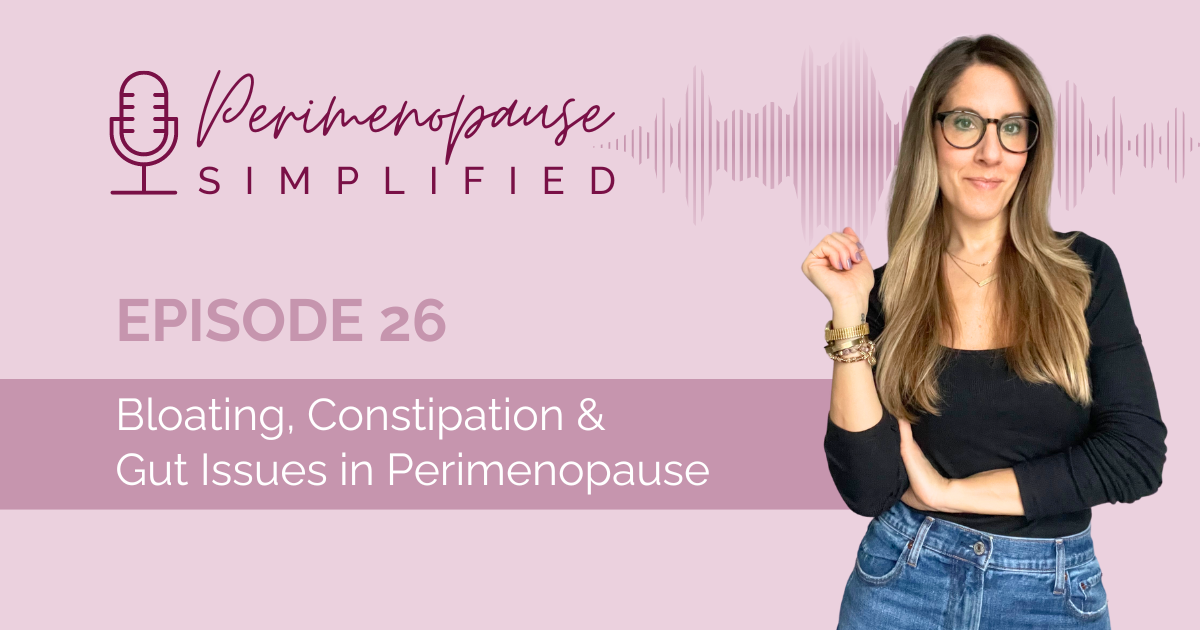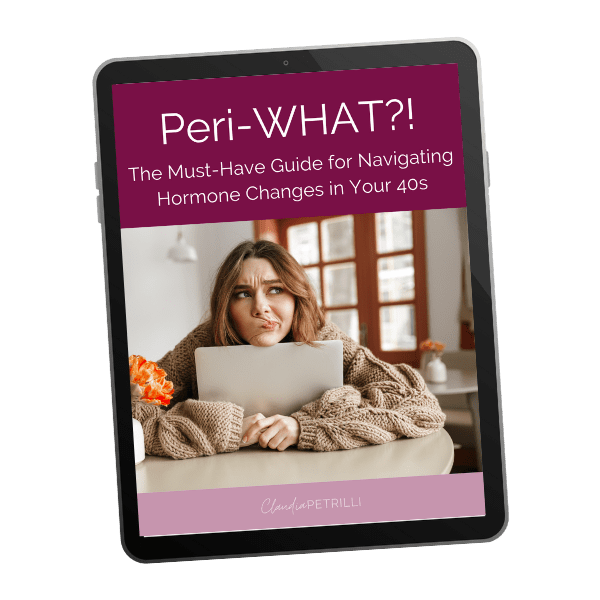
26. Bloating, Constipation & Gut Issues in Perimenopause
Don’t Miss An Episode!
In this episode, we covered:
- Common gut issues in perimenopause
- The gut and hormone connection
- Why estrogen is gut supportive
- Do you need to address gut health before starting HRT
- Why we utilize a stool test with clients
- Tips to optimize your gut health
Gut Changes in Perimenopause
Welcome to the show! Today I’m talking about your changing gut in perimenopause.
As you head into your 40s, you may notice you have more bloating, constipation, acid reflux, burping, diarrhea, and stinky gas.
As if we don’t have enough to deal with in peri, those seemingly innocent, quiet farts can be quite lethal to those around us.
Impact of Hormones on Gut Health
All jokes aside, when hormones start to decline, our gut function is impacted.
We need hormones for a healthy gut microbiome. We have hormone receptors all over our body, including our gut. And our gut makes and breaks down hormones.
Hormone Loss and Gut Health
In our peri years, we are losing progesterone, estrogen and testosterone.
Progesterone helps reduce gut permeability or leaky gut, when the tight junctions in our gut loosen up, allowing bacteria and toxins into the bloodstream.
Both progesterone and estrogen boost gut bacteria diversity and we want a diverse microbiome. Estrogen also maintains mucosal barrier function, regulates stomach acid and digestive enzyme secretion, and decreases the occurrence of peptic ulcers.
Testosterone improves the immune system in your gut, also known as secretory Iga – we explain Siga to our clients as their “gut army” or first line of defense. It protects the mucosal lining and helps ward off pathogens.
Hormone Changes and Thyroid Health
So, these hormones help to maintain the health and tissue of our digestive tract, reduce leaky gut, help with motility (movement of food), support stomach acid production, and strengthen our immune system.
These hormone changes also affect thyroid health, and in turn, your gut health. When the thyroid gland is not functioning optimally, it can cause a range of symptoms including digestive issues. Many people with chronic GI issues, like constipation, can’t find relief because they have an undiagnosed thyroid condition. It’s another reason why a comprehensive thyroid panel is a must in your perimenopausal years.
Gut-Thyroid Connection
And your gut affects your thyroid function! Inflammation, an imbalance of gut bacteria, low stomach acid, and infections like H. Pylori, impact your thyroid function. H. Pylori which is a very common bacteria overgrowth, which we see in many clients has been linked to Hashimoto’s. Hashimoto’s is an autoimmune disorder and one of the main causes of hypothyroidism.
And gut infections, “bad” gut bugs, and/or pathogens are stressors on the body. When the body experiences chronic stress, cortisol becomes imbalanced and impacts thyroid function.
Focus on Gut Health in The Hormone Rescue Program
So, we have a big focus on gut health in The Hormone Rescue program (which at the time of this recording will be OPEN for enrollment). So many clients come to us with GI issues and we know the role our changing hormones play.
We focus on mindful eating, addressing stress, detox support, mineral replenishment, an anti-inflammatory diet, and digestive function. And we look for underlying imbalances by utilizing a GIMAP stool test to address gut infections like h pylori, dysbiotic overgrowths, parasites, intestinal health, inflammation, and fungal overgrowths, like Candida.
Managing Acid Reflux
One symptom that’s very common in this stage of life: acid reflux – so many women are told to take antacids, which may help temporarily. But taking them long-term isn’t ideal because we need stomach acid to break down our food, so we can absorb nutrients, as well as protect us from bad gut bugs and pathogens.
But many women believe and are told that they have too much stomach acid, when that’s rarely the case. Let me explain…at the end of your esophagus, there’s a small tube called the lower esophageal sphincter (LES) which separates the end of your esophagus from your stomach. Think of it like a fist that opens and closes.
When you eat, the tube should be open, so food can travel to your stomach. When you’re not eating, the tube should be closed. This prevents food and digestive fluids from coming back up.
When you experience acid reflux, this is because that tube or sphincter is open or loose, when it should be tightly closed. It doesn’t mean you have too much stomach acid. It’s that your stomach acid is in the wrong place.
Properly Neutralizing Stomach Acid
While I’m not telling you to stop your PPI or antacid, I am telling you there are ways to properly neutralize stomach acid, which is part of what we teach clients.
Gut Health and Hormone Replacement Therapy
Moving along to HRT/hormone replacement therapy…some providers say you need to optimize gut health before starting HRT (hormone replacement therapy). And while for some women that may be the case, it will also be difficult to improve your gut health if you don’t have enough hormones on board. Replenishing hormones can help to improve the health and function of the digestive tract.
With that said, your gut regulates estrogen through an enzyme called β-glucuronidase. It breaks down estrogens into their active forms. But a compromised gut can impair the elimination of excess estrogen from the body. So if you’re taking estrogen HRT and don’t feel well or have ‘estrogen excess’ symptoms, you’re likely not eliminating estrogen efficiently, so your gut needs some work.
Gut Health and Mood
Another thing to consider is specific gut bacteria is needed to convert amino acids, like tryptophan, into serotonin. About 95% of serotonin, your “happy” neurotransmitter, is made in your gut! So if your gut is imbalanced in this stage of life, your mood will be affected. And women are 40% more likely to experience depression during perimenopause.
Importance of Regular Bowel Movements
Constipation is another common symptom we see. It’s not uncommon for women to skip 2-3 days at a time and what’s crazier is doctors often say this is normal!
Let’s be clear: you must be pooping daily (1-2 times is ideal). If you’re not pooping regularly, toxins and hormones, like estrogen, get recirculated in the body.
Not pooping can also cause an imbalance of gut bacteria, with low levels of healthy species and overgrowths of ‘bad’ gut bugs. This can lead to inflammation, gut infections and affect hormone production and detoxification.
Reasons for Constipation
Besides hormone changes and a sluggish thyroid, some reasons you may be constipated:
>> Dehydration
>> Chronic stress
>> Too little fiber
>> Food sensitivities
>> Sedentary lifestyle
>> Poor eating hygiene
Steps to Improve Gut Health
OK, now that you know what’s going on, here are some things you can do…
1) Increase fiber in the form of veggies/fruit – which feeds the good gut bacteria and binds to toxins to be eliminated; aim to get 25-30g fiber each day
2) Consume ample protein – if you can, invest in grass-fed and/or pasture-raised animal protein; please chew as much as you can and consider digestive enzymes
3) Calm your nerves – stress hormones slow down digestion and decrease stomach acid; practice 4-4-4 breathing (breathe in for 4, hold for 4, breathe out for 4; repeat)⠀⠀⠀⠀⠀⠀⠀⠀⠀
4) Remove common food triggers – gluten, dairy, corn, minimize seed or vegetable oils⠀⠀⠀⠀⠀⠀⠀⠀⠀⠀⠀⠀
5) Chew your food until it’s almost liquid, eat slowly; digestion starts in the mouth; your saliva releases enzymes when we chew; avoid drinking large beverages while eating – it dilutes stomach acid.⠀⠀⠀⠀⠀
6) Move more – I recommend aiming for 10,000 steps daily, preferably outside
7) Consider a spore-based probiotic – I love Microbiome Labs Megasporebiotic (save 15% with code: claudia123 – link in show notes)
8) Consider magnesium – most of us do not get enough of this valuable mineral; you can start with some magnesium citrate at night and see how you do; but switch to a more bioavailable form like mag glycinate for long-term use
OK hope that was helpful to you – see you next week!
~Claudia
Mentioned on this episode:
Probiotic I love: Microbiome Labs Megasporebiotic (save 15% with code: claudia123)
Sources:
https://pubmed.ncbi.nlm.nih.gov/28778332
https://link.springer.com/article/10.1007/s10620-018-4939-1
https://www.sciencedaily.com/releases/2024/05/240501091701.htm
https://www.ncbi.nlm.nih.gov/pmc/articles/PMC6865762/
https://pubmed.ncbi.nlm.nih.gov/8918592/
https://www.nature.com/articles/s41598-019-44448-0
https://my.clevelandclinic.org/health/diseases/23392-hypochlorhydria
Claudia Petrilli is a Functional Health Coach, Integrative Nutrition Coach, Women’s Health Educator, and creator of The Hormone Rescue program. Having experienced debilitating periods, digestive issues, a sluggish thyroid, a pituitary tumor, and perimenopause symptoms in her late 30s, she knows exactly what it’s like to get dismissed by doctors and spend years searching for answers.
To connect with Claudia Petrilli:
FREE GIFT: Peri-What?! The Must-Have Guide for Navigating Hormone Changes in Your 40s
WORK WITH US: The Hormone Rescue Program
QUESTIONS? EMAIL: claudia@claudiapetrilli.com
LOVE THE SHOW?! Please subscribe, leave a 5-star rating, review, and share, so that other women can find this podcast for guidance and support through their perimenopause journey!






